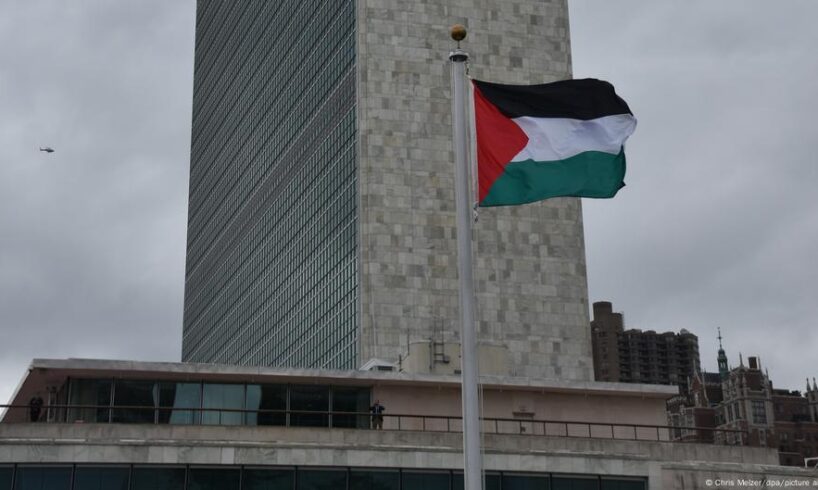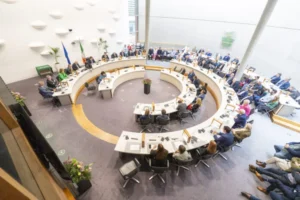
France, Belgium, Luxembourg, Malta and Andorra declared that they were recognizing the state of Palestine at the UN General Assembly in New York on Monday. The day before, the United Kingdom, Canada, Australia and Portugal recognized Palestine. These historic decisions bring to 156 the number of countries that currently recognize the Palestinian state.
The United States, on the other hand, strictly rejects recognition, as does Israel. Its prime minister, Benjamin Netanyahu, has described such a step as “a reward for terror” for the radical Islamist group Hamas— which is categorized as a terrorist organization by the Israel, US, EU and others — that led the terror attack on Israel on October 7, 2023 which sparked the war in Gaza.
For the Palestinian Authority, with its longtime President Mahmoud Abbas, recognition by such important states would be a prestige win and a diplomatic defeat for Israel, especially now with the conflict in Gaza escalating.
Germany looking for ‘two-state solution’
The German government won’t be taking this step “in the short term,” as it officially put it. “We won’t be joining this initiative,” said Chancellor Friedrich Merz from the governing conservative Christian Democratic Union (CDU) in August when Canadian Prime Minister Mark Carney visited.
However, Merz’s reasoning was rather formal in nature. “We do not consider the conditions for state recognition to be fulfilled in any way at present. Recognition must be the final step in a peace process that results in a two-state solution,” he said.
The difficulty is that a two-state solution is nowhere in sight. The chance of an independent Palestinian state alongside Israel seems to have been practically reduced to zero since the beginning of the war in Gaza, which has so far killed around 65,000 people, according to the Hamas-led Gazan Health Ministry. Critics therefore argue that the German government is only putting forward this unrealistic prerequisite for recognition to avoid making a decision.
German foreign minister: ‘A Palestinian state is our goal’
To view this video please enable JavaScript, and consider upgrading to a web browser that supports HTML5 video
Fight against antisemitism key for Merz
The German government is faced with a particular dilemma when it comes to Israel and a Palestinian state. As a consequence of the 6 million Jews murdered during the Nazi era, Berlin feels a special responsibility for Israel’s security and has even declared this to be a matter of “reason of state.”
For the German chancellor, this is clearly not just empty rhetoric. Earlier in September, during a speech at the reopening of a synagogue in Munich that had been destroyed by the Nazis, Merz fought back tears as he said “since October 7, we have been experiencing a new wave of antisemitism, in old and new guises, blatant and poorly concealed, in words and deeds, on social media, at universities, in public spaces. I would like to tell you how ashamed this makes me, as chancellor of the Federal Republic of Germany, but also as a German, as a child of the postwar generation, a child who grew up with the motto ‘Never again’ as a mission, a duty, a promise.”
Nevertheless, Merz has tried to separate the fight against antisemitism from his assessment of Israel’s policies and, above all, from Israel’s military actions in Gaza.
Ongoing military actions have destroyed large parts of Gaza and prompted a humanitarian catastropheImage: Omar Al-Qattaa/AFP
He has sharply criticized Israel’s military actions and the resulting humanitarian catastrophe, and in the summer stopped all arms exports to Israel that could be used in the Gaza war. At a ceremony marking the 75th anniversary of the founding of the Central Council of Jews in Germany, Merz said “criticism of the Israeli government’s policies must be possible; it may even be necessary. Dissent on this issue is not disloyalty to our friendship.”
EU, civil society call on Germany to take action on Israel
However, pressure is mounting on the German government to take a stronger stance. EU foreign affairs chief Kaja Kallas has called on Germany to participate in sanctions against Israel, and European Commission President Ursula von der Leyen has suggested that the EU suspend trade advantages with Israel.
Jens Spahn, chairman of the center-right CDU and CSU Union parties in the German parliament, said this reminds him of the darkest chapter in German history. “What will be the consequence? ‘Don’t buy from Jews’? We’ve been through all that before,” he said on the German public broadcaster ZDF, alluding to the Nazis’ calls for a boycott of Jewish businesses in the 1930s. When it comes to Israel and Gaza, Spahn warned, “the balance is very quickly lost in Germany and it tips over into antisemitism.”
Pressure is also mounting on the domestic front. The center-left Social Democrats (SPD) in the coalition government are certainly open to the idea of sanctions, and the opposition Green party has gone even further. Its co-leader, Franziska Brantner, told the German Press Agency dpa that Merz and Foreign Minister Johann Wadephul, also of the CDU, must decide: “Will they side with those who are working for peace for all people in Israel and Palestine? Or will they stand idly by and watch as an Israeli government, parts of which are extreme right wing, continues to rage in Gaza, making the prospect of peace and the release of the hostages increasingly remote?”
An alliance of dozens of civil society organizations has also launched a petition calling on the German government to follow up its criticism of Israel with action.
France to recognize Palestinian statehood
To view this video please enable JavaScript, and consider upgrading to a web browser that supports HTML5 video
Survey: German majority in favor of recognition
State recognition of Palestine, however, is another matter. And on this point, the chancellor appears to be standing firm, even though he clearly has a majority of the German population against him. In a survey conducted by the German Institute for Public Opinion Research (Forsa) at the beginning of August, 54% of respondents were in favor, while 31% were against.
Meanwhile, the front of countries opposed to recognition at the United Nations is shrinking and Berlin finds itself further on the defensive.
Meanwhile, the US, where the UN headquarters are located, has denied entry to Mahmoud Abbas, the president of the Palestinian Authority.
This article was originally written in German. It was first published on September 19, and later updated.





